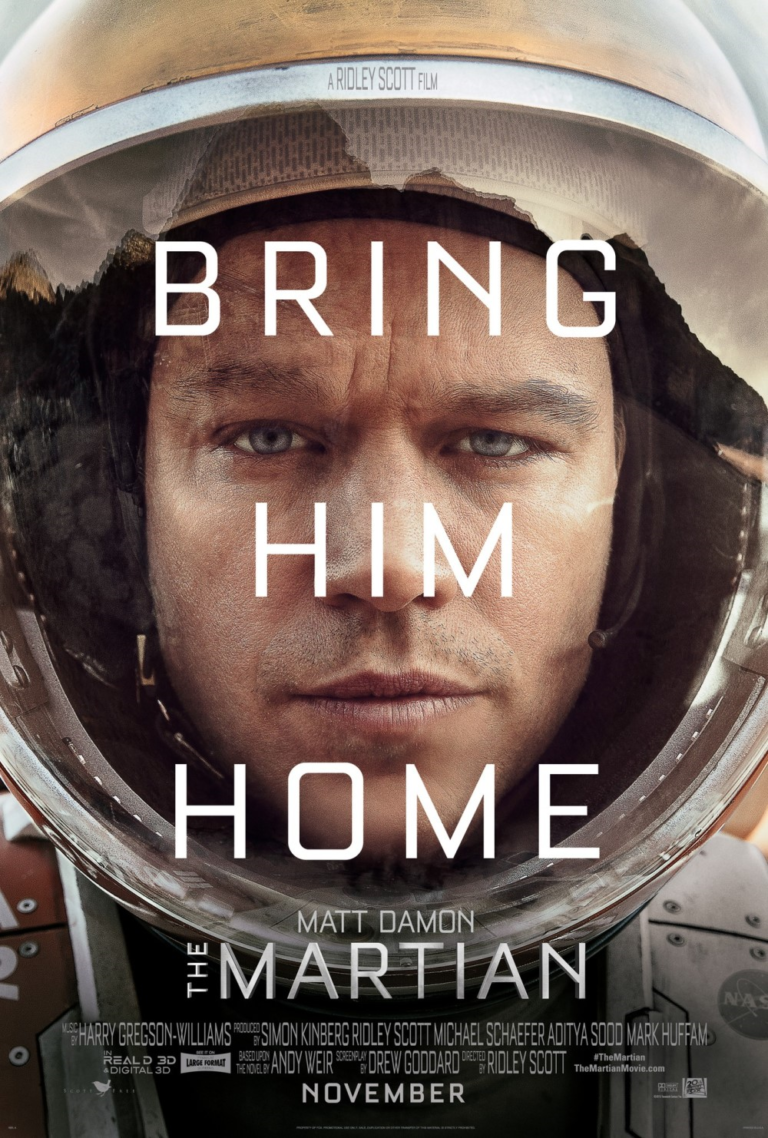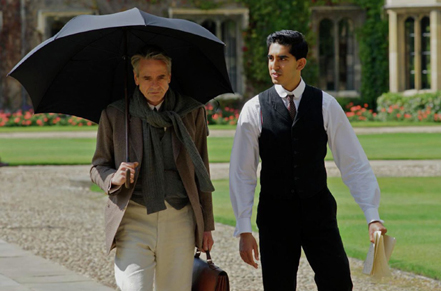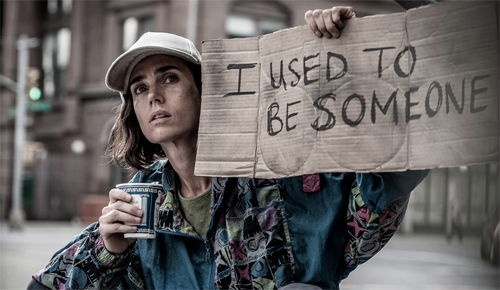In 1914 a self-taught math genius named Srinivasa Ramanujan left behind everything he knew when he boarded a ship that would take him from his life in Madras, India to Cambridge University in England. He was drawn to the prestigious school via a correspondence with English mathematician G. H. Hardy who recognized Ramanujan’s enormous potential not just for discovering known theorems without any formal education, but for seemingly cracking brand new ones.
Their collaboration is charted in director Matt Brown’s new feature The Man Who Knew Infinity starring Dev Patel and Jeremy Irons as Ramanujan and Hardy. Despite the left brained subject at hand, Brown’s film delves further into the very human story of a man faced with living in an entirely new world. Patel and Irons make for a compelling duo experiencing a huge, but ultimately fruitful, culture clash. The pair are supported by a roster of talented actors including Stephen Fry, Toby Jones and Kevin McNally. The road from Robert Kanigel’s book of the same name to its film adaptation was one that took over twelve years to travel and Brown spoke with me on the phone about how it all came together (Spoiler: It didn’t involve shoehorning in an unnecessary romantic subplot!)
Lauren Damon: First off, speaking as someone who knows nothing about math, you made a very touching film!
Matt Brown: [Laughs] Thanks, I don’t know much about it myself so thank you.
LD: Since this is your second feature since 2000, how long ago did you come across Ramanujan’s story and what made you decide to make it?
MB: Well…my aunt was a member of a book club and about twelve years ago I was visiting her and she introduced me to Robert Kanigel biography. I had done a small film right out of school that I never really got to finish and so this was my first sort of opportunity to do a little bit of a bigger film–or we were hoping it would be–but it was a long road. I mean it was twelve years trying to get this film made so I sometimes joke that I think I was nervous to go through the process of having to make another film and I picked maybe the hardest film in the history of the world to try to get made. [laughs]
LD: I read that you had had an interest in World War One, which this story takes place during but it’s not really the focus…
MB: No it doesn’t, it’s just with–You know I’d read Birdsong by Sebastian Faulks and I was really fascinated by the period, as anyone that has read that incredible book might be afterwards, and this was set against the great war and that just sort of got my attention for a second look at it. Once I’d read it, I really fell in love with the human story and the relationships. You know, as a writer, you’re always looking for conflict and drama and it just had two characters that couldn’t have been any more different. So it drew me in. I was drawn into the isolation that Ramanujan was going through…This illness and everything he went through was something I could really relate to because I was helping caretake actually for my brother at the time. I was helping with his wife because he had cancer. He subsequently got better and wrote all the music for the movie, so it was a happy ending.
LD: That’s amazing.
MB: It was pretty amazing.
LD: There are many biopics that handle these mathematical geniuses–like Theory of Everything or A Beautiful Mind–did you look to any of those?
MB: Sure I guess like over the years, I couldn’t not have. You know it was over such a long period of time, and I’m a movie lover so I’ve them all at this point, I think! [laughs] And it’s funny because we all have perceptions of films and they’re not always totally accurate what our perception is of what the film was. I remember watching Beautiful Mind one time to try to see how they portrayed the mathematics visually in it. And it was shockingly small, the amount actually. It was like the one moment where he adjusts the tie, and he makes the pattern of the tie work. And it was like small and subtle. I don’t even know if there was another moment in the movie that did it besides doing lots of math on the chalkboards. People writing furiously. You know and I didn’t want to do that. I wanted to do a film that was organic. Anything we tried to do we wanted to do it in the camera. And it was really important to me to just portray the mathematicians as multidimensional human beings that weren’t crazy and weren’t like frenetically insane and were actually, you know, complex flawed characters. So I didn’t need to make it into something it wasn’t already. I think just trying to be authentic to what the story as more than enough. I mean this had so much drama: Man breaks caste, leaves his country and his home, gets trapped by the war, goes all the way to England only to find that the one person that brings him there is emotionally completely unavailable…And how these two had to come together.
LD: Throughout the film, so many of the actors have to speak so passionately about what their characters are working on. Did any of them delve into studying what they were talking about?
MB: Yeah they both spent some time trying to–Well, first of all I just would say it was really important to Robert Kanigel who wrote the book that I philosophically understood some of what was going on with the mathematics. And certainly I came to respect them as artists, pure mathematicians. It was really important to Jeremy and to Dev. Jeremy, I know read A Mathematician’s Apology, they both read the biography and I think that they both wanted to do right by this story. So they, they did a lot of research on their own and they worked with [mathematician] Ken Ono who came to set and worked with me while we were shooting which gave the actors a lot of confidence that the script was right. That when they would point at a formula or when they would look at the notebooks, everything was exactly right. And you know it’s one of those things that afterwards you know people always say that ‘well, the math people of the world will love your movie’ but I’m like ‘well, actually you don’t take that for granted.’ It’s really been humbling that I can have Freeman Dyson or Steven Strogatz be like ‘You got us. You did it.’ You know and that really means a lot to me. And so that aside, I want the movie to touch people that are not mathematicians. It’s very important that–that’s who I made for was for people like me or you or anyone that doesn’t know math and maybe we could just respect it as an art form and come to see their passion with it. Really the movie is about acceptance and the human story.
Jeremy Irons with director Matt BrownLD: Meanwhile, I feel like Dev Patel probably wasn’t so much a household name until after Slumdog Millionaire in 2008, but you had the rights to the story for so long, how did that casting come together?
MB: I mean it’s been, it’s just been a process. I think when we started Dev was you know just had done [Slumdog Millionaire]. It was so long ago. You know, we went through different actors at different points over twelve years trying to get a movie made. But you know I think it was sort of–I have to think that there’s a plan for these things in some sense. And I knew that I wasn’t gonna compromise on the film in terms of the overall authenticity of it. I mean I’ve mentioned to the press at different times that [producer] Ed Pressman really stood by me when we had been offered opportunities to make the film if we would have Ramanujan fall in love with a white nurse to get it financed. And we didn’t do that. So I think there’s just a bigger plan at work and it happened the way it happened. Dev was ready to go at the right time and committed to it and felt like this was a character–he saw the nobility of the character and it was really important for him to play this role. And it’s a different kind of role for him than we’ve seen him in before and he does it brilliantly. And for Jeremy, I think it was an opportunity to revisit something in a different way as an actor for him. And he, his performance is just so pure and beautiful. I’m just humbled to be part of it.
LD: You also have an amazing supporting cast with Stephen Fry, Toby Jones…
MB: Yeah and Jeremy Northam, all those guys. You know, Stephen Fry is amazing–they’re all amazing–but Stephen you know he had his own project, for ten years trying to get it made, and when we found out that we were gonna be making the film I reached out to him and I said do you wanna maybe join our team for this? And he did! And he flew all the way to Chennai for a weekend. Just took two days to shoot, to play Sir Francis Spring in it. And it was such a big thing for the movie to have the first time you see British actor to have that kind of gravitas that Stephen Fry could bring to it. That authenticity was a really great gift that he gave the film. But they were all wonderful.
Dev Patel and Stephen FryLD: How long were you filming in India?
MB: Not long, about nine days. Which was really…it was hard because it was an independent film and you obviously get compared to I don’t know, movies like–I mean, I’m really flattered anytime anybody ever mentions like the John Nash film for instance that was about fifteen times our budget [laughs] you know? So if it’s even in the conversation. But you know, we had a very short shoot compared to those kind of movies and we did twenty two days in England and then we had to say goodbye to our crew after we’re in a great rhythm. And then we switch to India, to Chennai, which is nothing like Madras in 1914. It was a real challenge and a brand new crew all of the sudden which is Indian and goes to a totally different rhythm. It was a tribute to my team–my production designer Luciana Arrighi, the cinematographer [Larry Smith], my costume designer [Ann Maskrey]– that they all came out alive and in one piece. [laughs]
LD: I’ve read now that you’ve also adapted an Ian Fleming biography, are you actively working with that?
MB: No that’s something I had written a while back. That’s, I’m not really sure what the state of that. I think that they said that that was going into production this year though so that was exciting. I have another movie called London Town that I think is in the Los Angeles film festival right now and then doing, I think it’s having a premiere maybe in Cannes. And that’s about falling in love with a band for the first time. A young man coming of age story with the band The Clash and Joe Strummer. Jonathan Rhys Meyers stars in that.
LD: That’s quite a change from Mathematics and World War One!
MB: Right? But you know what, it’s not though. That’s the funny thing, I thought the same thing then I was thinking about it more and more…It’s socially conscious kind of and it’s about artists, you know, so in a weird way it isn’t so different. But yeah, it is different because it’s a little easier on the face of it to rock out to Joe Strummer.
I screened The Man Who Knew Infinity as part of the 2016 Tribeca Film Festival. It is currently in limited theatrical release with national expansion in the coming weeks.



